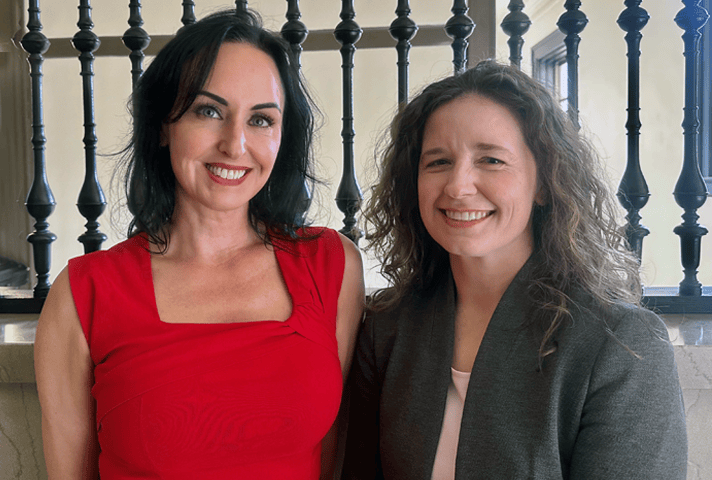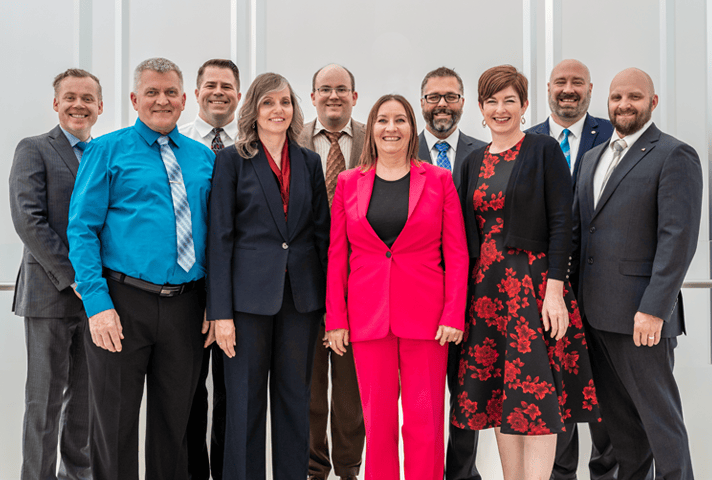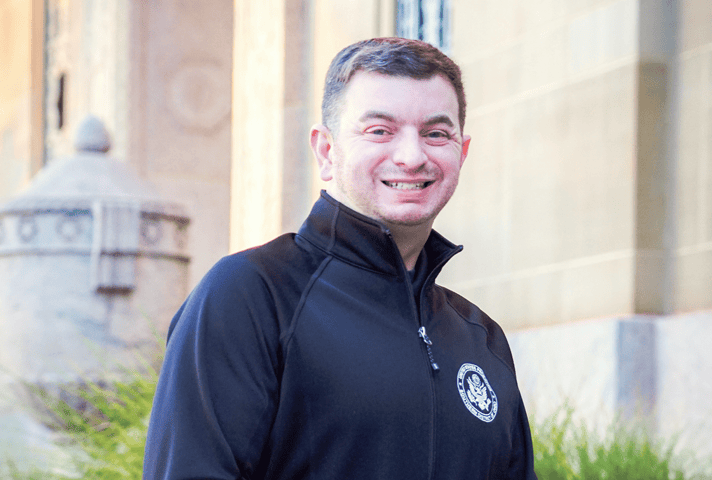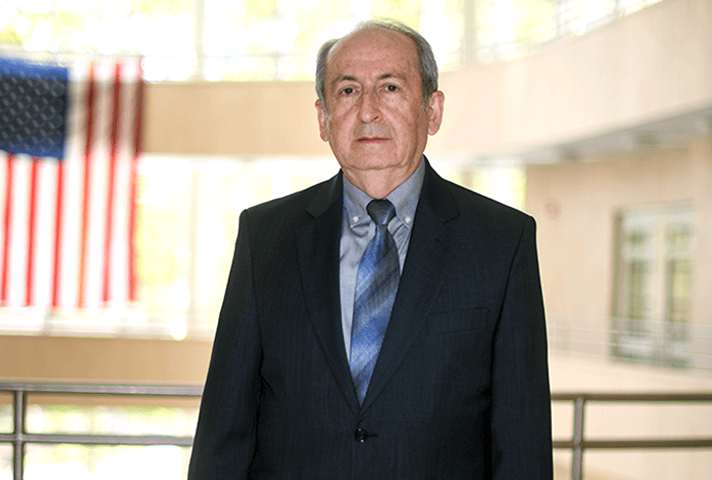A total of 19 employees have received the 2023 Director’s Awards, which recognize employees who have exemplified the core values, issues, strategies, and goals of the Judiciary, as expressed in its Strategic Plan.
The recipients were nominated by colleagues based on career achievements and contributions to specific projects that have benefited their home courts and the federal Judiciary as a whole.
The awards are “part of a longstanding tradition of recognizing outstanding performance, innovation, and dedication by employees throughout the Judiciary each year,” said Judge Roslynn R. Mauskopf, director of the Administrative Office of the U.S. Courts.
Eight awards were granted, some to multiple employees, in three areas: Outstanding Leadership, Excellence in Judiciary Services, and the Director’s Award for Extraordinary Actions.
The Director’s Award for Outstanding Leadership is given to managerial employees who have demonstrated exceptional leadership of a project of national significance. This can include exhibiting exemplary stewardship of resources; fostering innovations that improve service; increasing workforce productivity and conserving resources; promoting public access to and awareness of the role of the Judiciary; promoting safety and security, including cybersecurity; and enhancing public trust in the Judiciary.
Director’s Awards for Excellence in Judiciary Services recognize employees who have made specific contributions to improve efficiency, operations, or effectiveness. This may include outstanding contributions in areas such as administration, technology, court support, safety and security/cybersecurity, and legal services.
The annual award program had been suspended since 2020 because of COVID-19 disruptions. Here are the 2023 Director’s Award winners and their achievements.
Outstanding Leadership

Aleksandr Usherenko, programmer and systems administrator for the Eastern District of New York, has helped devise a process that automatically feeds case outcomes into the FBI’s National Instant Criminal Background Check System (NICS) for firearms-purchaser background checks.
Under Usherenko’s leadership, the court developed software to extract case-disposition forms in all criminal cases from the Judiciary’s Case Management/Electronic Case Files (CM/ECF) system and associated data from the Probation and Pretrial Services Automated Case Tracking System (PACTS) to create a package containing case, counts, PDF document(s), FBI number, Bureau of Prisons number, and other identifying information. The package is sent to the Department of Justice (DOJ).
The DOJ matches the data received from the court and individual DOJ agencies with appropriate FBI systems to improve the ease and accuracy of criminal instant background checks.
His work, done in collaboration with the Justice Department, FBI, and the Administrative Office of the U.S. Courts (AO), has laid the foundation for a national pilot study involving eight to 10 district courts. Usherenko has developed software to simplify adoption by other courts, and the system could eventually help all 94 district courts meet the Judiciary’s obligations under the Fix NICS Act, which Congress enacted in 2018.
“The development of the Fix NICS program is a notable example of all three branches of the federal government working together to serve the American public,” wrote Brenna B. Mahoney, clerk of court for the Eastern District of New York (EDNY). “The system that Aleksandr Usherenko designed and developed will improve how case disposition information is collected and managed as part of the judicial process. … It will help to ensure the accuracy of the information that is used in background checks and NICS checks.”
Mahoney added that Usherenko “was able to build this necessary system while still performing his responsibilities as the only programmer in the EDNY, one of the largest and busiest district courts in the country.”
Excellence in Judiciary Services




Kate Padbury, former supervisory staff attorney and current assistant circuit executive for court administration for the Fifth Circuit U.S. Court of Appeals, and Adriana Dieringer, supervisory staff attorney for the Fifth Circuit U.S. Court of Appeals, greatly increased the court’s efficiency in processing cases, even as the office was reducing staff.
“By thinking outside the box and applying critical thinking to longstanding procedures, Kate and Adriana developed a well thought out plan,” wrote Kim B. Tycer, senior staff attorney for the Fifth Circuit, who nominated Padbury and Dieringer. “The results were miraculous.”
When Padbury and Dieringer assumed leadership of a new Quick Response Team, in late 2021, the court had 1,172 pending cases, which required an average of 12 months to process. By July 2022, the number of pending cases had fallen to 652, a decrease of 44 percent. Average processing time fell to four months.
Working from a broad concept laid out by Tycer, Padbury and Dieringer developed case-specific checklists that enabled the team to use a streamlined writing process for select case types. They identified case types amenable to the new process and worked to eliminate unnecessary language from the memoranda prepared for the court. Padbury and Dieringer managed a team of 10 attorneys who used the checklists to more efficiently address the relevant legal issues in each case.
“Simply put, Kate and Adriana replaced the lengthy, time-consuming briefing process with a technology-based, comprehensive checklist,” Tycer wrote. “The Quick Response Team’s success enabled the Staff Attorney’s Office to keep pace with the court and provide timely justice to all. … Kate and Adriana’s superior leadership directly caused these outstanding results.”
Excellence in Judiciary Services




The CHAP Development and Support Team, of the District of Utah Bankruptcy Court, has provided national development and support to bankruptcy judges and courts with a streamlined, flexible interface for calendaring and managing cases. During the pandemic, the CHAP Team assisted nine new courts in adopting the browser-based software while also delivering new features to increase security and support public access to virtual hearings.
The court, which developed the Chambers Automation Program (CHAP) locally, was tasked in 2008 by the Judicial Conference Information Technology Committee to make the software available to other bankruptcy courts. Today, 200 judges in 62 bankruptcy courts manage their work and court calendars using CHAP. Additionally, 38 courts use the ChapMobile App (available in iOS and Android) to provide on-demand court calendars to the public.
“Over the past three years, the Judiciary has faced numerous unprecedented challenges that have resulted in an extraordinary workload increase for the CHAP Team,” wrote Joel T. Marker, chief judge of the District of Utah Bankruptcy Court, who submitted the nomination. “The CHAP Team’s dedication to going the extra mile places them in a league of their own.”
In addition to calendaring, judges and law clerks can create bench memos, notes, and access case dockets and claims registers. Being fully integrated with the CM/ECF system, it also enables courts to offer attorneys the ability to self-schedule hearings 24/7 within specified blocks of time.
“I hesitate to think where we would have been in trying to keep operating seamlessly during the pandemic (which I believe we achieved) without CHAP,” wrote Mary Ann Whipple, chief judge for the Northern District of Ohio Bankruptcy Court, in a letter supporting the nomination.
A total of 11 staff members were named as recipients of the Director’s Award. They were Brenda Dowler, CHAP support and training manager; Jonathon Hair, CHAP product/software development manager; and nine members of the CHAP development and support team: Heather Aslett, Nancy Carter, Kent Crockett, Andrew Groenewold; David Lemmon, Ian McMurray, Jeffrey Middleton, Scott Thackeray, and Jared Vanderhoff.
Excellence in Judiciary Services




Vanessa Armstrong, director of financial integrity for the Sixth Circuit U.S. Court of Appeals, provides assistance and training to courts and federal public defender offices (FPDOs) in the Sixth Circuit and elsewhere in the Judiciary with audit preparation, financial and budget management, self-assessments, internal controls, process improvement, travel policy, and other areas related to management of public funds.
“The position is the only one of its kind in the Judiciary,” wrote Marc Theriault, Sixth Circuit executive, who nominated Armstrong. “Under Vanessa’s leadership, the position has become an integral support mechanism for Judiciary employees responsible for finance, budget, procurement, and internal controls. Since its inception, the program has grown from a circuit-wide position to one that has national reach.”
Armstrong, who previously served as district court clerk of court for the Western District of Kentucky, assumed her current position in January 2021.
She emails weekly updates and hosts online conversations with the AO subject matter experts. Armstrong credits the talent of and collaboration with AO employees for her ability to bring information to her constituents.
More than 1,000 Judiciary employees have signed up for Armstrong’s weekly updates, and her training videos were viewed 2,000 times in the previous year, Theriault wrote. Online conversations regularly have hundreds of viewers, on such topics as accountable-officer liability, self-assessments and cyclical audits, procurement, budget, and tenant alteration/cyclical maintenance delegations.
“Vanessa’s work is entirely focused on helping court units and FPDOs throughout the circuit (and in practice, the entire Judiciary).” Theriault wrote. “Vanessa’s work simplifying complex issues and explaining how to implement best practices to court users and FPDOs in a collaborative manner is the epitome of ‘Excellence in Judiciary Services.’”
Excellence in Judiciary Services




Victor M. Rodriguez, IT support specialist for the Middle District of Florida, created a comprehensive mobile application providing judges and employees with essential security contact information and critical notifications in the event of weather emergencies, court closures, and other urgent situations.
“This app will greatly assist the district in keeping the judges and employees of the Middle District of Florida informed and therefore safer,” wrote Elizabeth M. Warren, clerk of court for the Middle District of Florida, who nominated Rodriguez. “The Middle District of Florida courthouses handle numerous elevator entrapments, weather emergencies, and various downtown safety issues during and after hours. But the affected judges and employees rarely have security contact information at their fingertips during a time of need, resulting in preventable stress and potential danger.”
By using the location data captured on cell phones, the app can display an interactive contact card with phone numbers for local U.S. Marshals, court security, and Federal Protective Services offices whenever employees are at or near the courthouse. Rodriguez carefully designed the security application so it can easily be retooled to help other districts disseminate security information. The application is compatible with both iOS and Android devices, ensuring a wider reach and accessibility for a wide array of users.
“Mr. Rodriguez is a shining example of what the Judiciary can accomplish with hard work, ingenuity, and dedication,” Warren wrote. “Mr. Rodriguez’s unwavering dedication, technical skills, and refinements finalizing the MDFL app have demonstrated to our court that he is an exceptional employee within the Judiciary both now and for future project initiatives.”
Extraordinary Actions




Kadi Murray, intensive supervision specialist for the Middle District of Florida Pretrial Services Office, successfully prevented a suicide by a defendant who was under supervision and awaiting trial.
“Her willingness to go above and beyond the call of duty prevented an outcome that could have been devastating for the defendant and his family,” wrote Suzanne Arwady, deputy chief pretrial services officer for the Middle District of Florida, who nominated Murray.
After midnight on Oct. 6, 2022, Murray received an alert that a defendant under location monitoring supervision had traveled outside of their residence without prior approval. She immediately began calling the defendant and his family to try and determine his whereabouts. Upon getting in touch with the defendant’s father, she was able to provide him with the defendant’s exact location using GPS mapping.
The defendant’s father arrived on the scene to find his son had doused himself in gasoline and handcuffed himself to the steering wheel of his vehicle with the intention of killing himself. Simultaneously, Murray called 911 and provided them with the defendant’s GPS coordinates while the defendant’s father described the situation to her. She worked with local law enforcement to have the defendant evaluated and taken to a hospital for medical attention.
“In our line of work, we often do not get a chance to see the impact we make on the lives of the people we supervise, but this situation demonstrates a direct example of how Intensive Supervision Specialist Kadi Murray made a difference and actually saved someone’s life,” Arwady wrote.
Extraordinary Actions




Brent Willoughby, probation officer for the Southern District of Ohio, helped a man under supervised release overcome his alcohol addiction, and also helped improve trust between supervisees and probation officers systemwide.
During a Jan. 21, 2023, mentoring session for people under supervision, the man whom Willoughby helped get sober credited him for saving his life and encouraged those in attendance to “give your probation officer a chance by working to develop a trusting, honest relationship. Officers are here to listen, assist, and support.”
The man explained how Willoughby answered his late-night plea for help, dropping everything to rush over to meet him at a bar, while he was still under the influence. Willoughby listened to his troubles and developed a creative solution to get him home safely and address his substance abuse issue moving forward. The next day, Willoughby was at the man’s front door ready to help him get admitted into a treatment program.
“The individual’s testimonial was so powerful that it generated great conversations with those in attendance about what is possible between individuals on supervision and their United States Probation Officers,” said Deborah Williams, former federal defender for the Southern District of Ohio, who also attended the program.
“As a result of Brent’s extraordinary actions, the … individual is no longer abusing alcohol, which reduces the probability of engaging in new criminal conduct,” wrote Chief Probation Officer Mark Grawe and Deputy Chief Probation Officer Lisa Dopp, for the Southern District of Ohio, who nominated Willoughby.
Extraordinary Actions




Auralea L. Prince, automation specialist for the Northern District of Ohio Bankruptcy Court, provided lifesaving CPR after a man’s car crashed outside her home, while she was teleworking.
On Dec. 2, 2022, in Dorset Ohio, Prince was participating in a virtual staff meeting when, “She saw a minivan race across her front yard and crash into a field next to her house, somehow narrowly missing two trees and a pasture fence,” wrote Donald P. Hinkson, deputy clerk for the Northern District of Ohio Bankruptcy Court, who nominated Prince.
She rushed outside to assess the situation and saw an older man get out of the car. When she called to the man asking if he was all right, he collapsed onto the highway. Prince hurried back to her house to dial 911 and ran back outside to help the collapsed man. Realizing he wasn’t breathing, she began administering CPR, continuing nearly 20 minutes.
When a volunteer firefighter took over CPR, Prince continued to update the 911 dispatcher. Ten minutes later, an ambulance crew arrived and was able to restore the man’s pulse using an AED, before taking him to a local hospital for further examination.
“Lee’s decisive actions in response to this medical emergency that unfolded in her front yard and while teleworking displayed her exceptional concern for the well-being of others and the preservation of life,” Hinkson wrote. “Putting her own personal safety at risk, she administered CPR in the middle of a state highway in an effort to save the life of a person she did not know.”
Related Topics: Awards & Honors
This post was originally published on this site be sure to check out more of their content.







